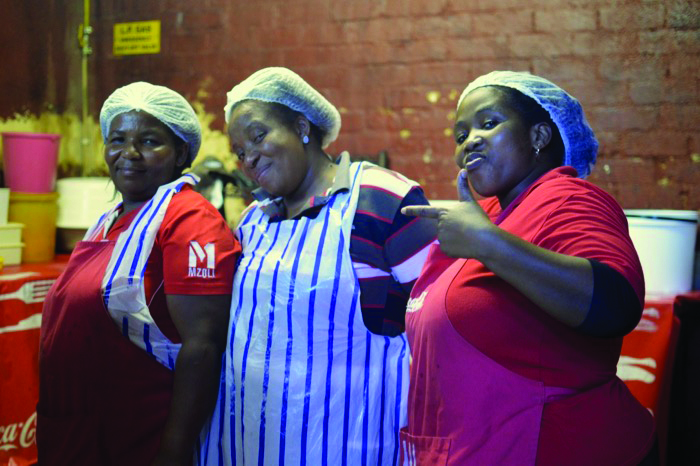Mzoli Ngcawuzele’s wife doesn’t mess around on the days she supervises her husband’s popular barbeque joint. With a head of tightly-curled black hair, thick dark makeup, and a hearty stare, she somehow wields a presence equally stern and analytical, as if she’s always taking in the world around her and parsing it into a million little pieces. When we walk in and start whispering excitedly about the rows of ribs, tongues, necks, and ground meats on display, I can see her watching us. From what we’ve learned, her life has changed a lot in the past few years, from dreaming of opening a meat market here in Gugulethu, a place that isn’t well-served by the entrepreneurial spirit that pervades much of Cape Town, to becoming what some people believe is the most thriving –and controversial—business in the townships.
We are here, in-between visits to some of the area’s local primary schools, to try this legendary barbeque (what is commonly called braai here in South Africa) and to meet the eponymous Mzoli himself. Mzoli’s has been in operation since 2003, after Mzoli obtained start-up funding from the Development Back of South Africa, an organization that supports black-owned independent businesses. His original plan, which was to sell locally-sourced meat to entrepreneurs to take back and sell in their own braai stalls, quickly morphed into something else as people fell in love with the sweet caramelized taste of his grilled barbeque and the outdoor seating. From there, he opened up the restaurant to DJs who needed a place to spin local kwaito music, and it morphed again: it became a tourist destination. Even newspapers around the world have picked up on it, with CNN even going so far as to erase the township’s post-Apartheid struggles entirely and calling it “a place where social and racial barriers are set aside as locals and out-of-towners come together to eat, drink, and party.”
Entering Mzoli’s isn’t exactly a triumphant or memorable experience. After passing through iron gates and going under a door frame painted blood red, we find ourselves standing on white linoleum and choosing the meats we want for lunch. At Mzoli’s, you pick your meat first. Then, it goes into the back in a large silver bowl, gets marinated, grilled, and brought out in a large tray. We can see it immediately: Mzoli’s is the kind of place where people get their hands dirty, throwing slabs of beef onto a burning-hot grill and swirling spatulas into vats of pap, South Africa’s cousin to Southern grits. It’s a place where people take your order, wash dishes, roll sausages, stock meat, marinade meat, cook meat, and prepare pan after pan of fluffy steamed bread to sop up the leftover juices.
As we sit down to wait for our meal, I ask Mzoli’s wife if I can meet some of the kitchen staff. She takes me into the back and introduces me to everyone—to the men marinating the meat in giant stainless steel bowls; to the women taking turns stirring the pap; to Mzoli himself, running around directing traffic. Twenty minutes later, I’m still back there, learning how to properly toss the slabs of meat into the burning-hot oven. Two of my colleagues come looking for me and wave me back to the table. I follow them back outside, take a seat, tear open the thickly-sauced meat with our fingers, and watch as barbeque sauce drips off the bones.
I’m impressed with the taste of Mzoli’s—and I can see how complicated it is, a small locally-owned business that has become popular in unexpected ways. Mzoli’s wife sits inside; a stabbing happens outside; tourists arrive in an Uber. Around us, the lines are continually drawn. After all, we are still in South Africa, a place undeniably formed, reformed, and formed again by forces larger than all of us, even on a paper plate of barbequed beef.







Be First to Comment